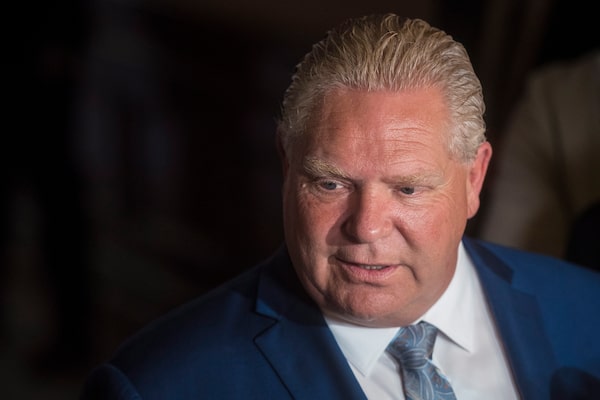
Ontario premier-designate Doug Ford speaks to the media during a break from the first meeting of the newly-elected Ontario PC caucus at Queen’s Park in Toronto, on June 19, 2018.Tijana Martin/The Canadian Press
Ontarians are a week away from finding out what a Doug Ford government looks like, after he and his ministers are sworn in next Friday.
For now, Mr. Ford’s Progressive Conservatives are mostly preoccupied with transitional work – briefings, lining up staff, orientation sessions for a swarm of rookie MPPs that includes the premier-designate himself.
But for those hankering to know how Mr. Ford will approach his early days in office, he has already sent a few early signals – some publicly, and others behind the scenes.
HE WANTS TO MOVE QUICKLY ON CAMPAIGN PROMISES
The PCs appeared this week to somehow be changing government policy before taking over the government – announcing an end to hundreds of millions of dollars in incentives for energy-efficient home improvements, with an immediate cutoff for signing contracts eligible for rebates.
What they were actually doing, so far as one can tell, was sending notice that they will end the programs immediately upon taking office, with the cutoff applied retroactively. But the message was that Mr. Ford can’t wait to get rid of departing premier Kathleen Wynne’s climate-change strategy, and he promises that the cap-and-trade program whose revenues fund the energy-efficiency subsidies will quickly meet a similar fate.
Given that companies have already purchased $2.8-billion in credits to be cap-and-trade compliant, Mr. Ford would have an excuse to move slowly. And there are people around Queen’s Park arguing that he should show that kind of patience, generally – taking the summer to form policy plans, and let ministers get acclimated, after running on a platform extremely light on implementation details.
All indications out of Mr. Ford’s camp, though, are that he doesn’t think he has time to waste before starting to deliver on various commitments to make life more affordable, possibly even planning a brief summer sitting of the legislature to start introducing tax cuts.
HE’S LESS SURE WHAT TO DO ABOUT URGENT ISSUES HE DIDN’T RUN ON
A sharp contrast to Mr. Ford’s certainty on something such as climate policy is his hedging on whether to proceed with the province’s plans to sell marijuana through government-run stores, or allow private sales as he suggested prior to the election before backtracking.
If Mr. Ford wants to launch consultations, as he said Thursday, he had better do so quickly: The federal law legalizing recreational cannabis takes effect in October, and provincial sales outlets have already been leased.
His apparent discomfort with the issue is understandable, since it divides free-market and social conservative members of his party, and his own hash dealing back in the 1980s, revealed in a 2013 Globe and Mail investigation, is liable to re-enter the conversation. But his handling of it will also be a good early test of how he deals with decisions foisted on him that weren’t part of his platform – which, the longer a premier stays in office, becomes more and more the job.
HE INTENDS TO PUT HIS STAMP ON THE PUBLIC SERVICE
It hasn’t taken long to get the impression that the provincial bureaucracy is in for big changes on a couple of fronts.
One is culture. Belt-tightening policies announced alongside a hiring freeze – travel restrictions, no more catered food for staff meetings, cancellation of media subscriptions – may cause snickering in government and corporate circles. Likewise Mr. Ford’s suggestion that PC caucus get-togethers will feature Costco burgers purchased out of pocket. But he’s setting a tone, and it’s one that many Ontarians who voted for him will think is overdue.
The other is staff. The retirement announcement this week by health deputy minister Bob Bell, one of the most powerful bureaucrats Ontario has seen in recent years, was probably not unrelated to the desire of Mr. Ford’s preferred health-policy guru, Rueben Devlin, to chart a different course. Expect more departures as the Tories settle into office, particularly among those who, like Dr. Bell, were particularly influential under the Liberals.
HE’LL HAVE AN INTERESTING MIX OF PEOPLE WORKING THE POLITICAL BACKROOMS
Almost immediately after his election win, Mr. Ford announced that his chief of staff would be Dean French – a friend who, until serving as Mr. Ford’s campaign chair, had not been terribly prominent in political circles since working for the Canadian Alliance under Stockwell Day nearly two decades ago.
More recently, it’s emerged that another very senior role in his office will be served by Jenni Byrne, the former federal Conservative campaign director who was one of the most powerful people in Stephen Harper’s Ottawa.
That seems to suggest the continuation of a dynamic from this spring’s campaign: Mr. Ford being advised by a mix of political professionals (such as Ms. Byrne) and Ford Nation sorts (such as Mr. French).
It could make for a good balancing act, or for tensions that prove untenable as Mr. Ford’s government really gets down to business.